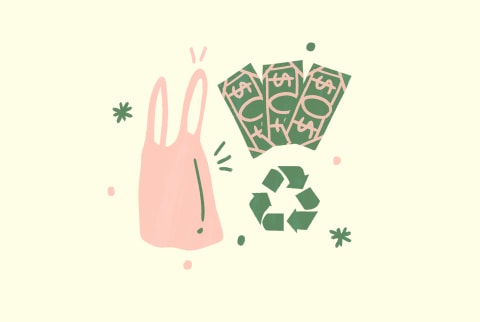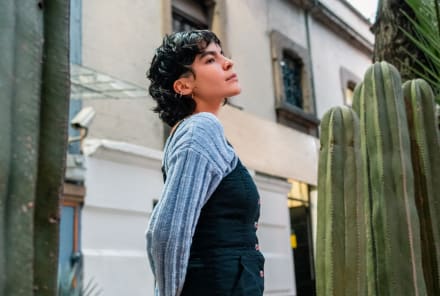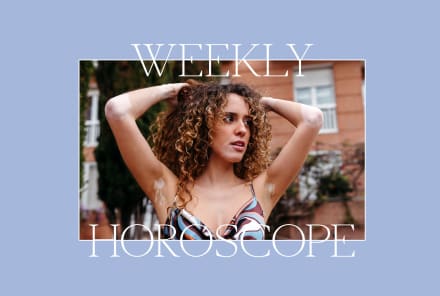Advertisement
How To Amplify Your Action This Plastic Free July


During Plastic Free July—an annual movement to reduce single-use packaging waste—over 300 million people around the world scour bulk bins and sport reusable coffee cups in service of a less trashy future. And yet, plastic production continues to climb globally, and plastic pollution is expected to nearly double as soon as 2025. Despite increasing public awareness of the dangers of plastic, it's clearly still being produced at record speed. So what gives?
It could be a case of something we talk about a lot in the health world: Treating symptoms without addressing their root cause. In many ways, plastic is just a manifestation of our throwaway culture. This means that getting rid of it won't just take more reusable razors and fewer straws. It'll require a totally new way of living.
What will need to happen before we can reduce plastic production?
Plastic Free July operates off the idea that when enough people opt out of plastic, it sends a signal to industries that they should be creating less of it. "Governments and corporations play a critical role in moving us away from single-use plastics," Rebecca Prince-Ruiz, the founder of the movement, tells mbg. "As consumers and citizens, our actions and advocacy can and must influence them."
While adopting a low-waste lifestyle (if you have the means to do so) is definitely a step in the right direction, all signs suggest that it needs to be followed up with a larger reckoning with what plastic is, what it represents, and why it's so harmful—for the planet and for us humans.
For instance, new research out of Germany just concluded that since single-use plastic has become so synonymous with quick convenience, moving away from it will require us to "change the relevant infrastructures, economic incentives, and political framework conditions" on a massive scale. The report continues that "the goal of reducing the use of plastic packaging will not be achieved by merely asking consumers to shop exclusively in zero-waste stores."
Expanding our view on plastics.
So in addition to sporting your favorite tote, Yinka N. Bode-George, an environmental health advocate, tells mbg that this Plastic Free July, "We have to be having very comprehensive conversations around plastics."
Her group, the National Caucus of Environmental Legislators (NCEL), advocates for sustainable reform across state government. And while they recognize that plastic can cause ecological harm, they see it primarily as a health and environmental justice issue.
"There's so much to be said about the public health impacts of plastic pollution and the environmental injustices that occur with plastic materials," she says. Beyond affecting sea critters, plastic has very real impacts on humans across its lifespan—from the fracking of its raw materials to its disposal in landfills or incinerators. Toxins are emitted at every stage, and they disproportionately affect poor and BIPOC communities.
When considered from this perspective, it isn't just the material that's the issue: It's the whole system that prioritizes global convenience over community livelihood.
One potential solution that the NCEL supports is the Break Free From Plastic Pollution Act—a proposed plastic reduction legislation in the U.S. that considers both the human health and environmental impact of plastics. The bill, which was recently reintroduced to Congress, recognizes that moving away from plastic will take a total reimagining of the way our society operates.
The policy aims to reduce the need for new plastic material (by supporting reusable alternatives), ban hazardous packaging (by prohibiting certain classes of chemicals), improve recycling and recyclability (by passing minimums on the amount of recycled content companies need to use), and extend producer responsibility (by making companies responsible for collecting and responsibly disposing of their own packaging). The comprehensive bill also calls for language services that can help ensure non-English speakers have their voices heard in plastic hearings.
When considering what the future could look like under this proposed bill, Bode-George says, "It looks like reusables. It looks like community members, particularly BIPOC and low-income people, being centered in a circular economy... It looks like communities where people aren't facing high asthma rates because of incineration facilities. It looks like communities where there isn't an abundance of litter because of inadequate recycling infrastructure. It just looks like a better world."
If this sounds like a future you'd like to support, consider amplifying your impact this Plastic Free July with the following actions:
Call or write to your state and local representatives.
Bode-George has seen firsthand how state legislation can ladder up to national change. She lists Colorado, Maine, Vermont, and Washington as states that have exciting plastic reduction legislation in the works right now. "These bills work as great models for other states who don't already have their own single-use bans or recycled content strategies," she says.
To become more involved in state-level action, she recommends contacting your congressional representatives and asking if they would support the Break Free From Plastic Pollution Act and/or advocate for zero-waste efforts on the state level, like those we're starting to see elsewhere in the country. (New to this? Here are some beginner tips for effective political engagement.)
In doing so, you can help build momentum for action on the federal level. "In so many ways, states spotlight opportunities for federal action," Bode-George says. "This is movement work. When you create a large interdisciplinary movement, it's hard not to pay attention to it."
Gather with like-minded people in your own community.
In addition to speaking out about politics, you can also take plastic reform action into your own hands—starting in your own community.
Sandra Ann Harris, the founder of ECOlunchbox and author of Say Goodbye to Plastic, is one community organizer who recently explained her strategy to mbg: She linked up with others in her area who were concerned about plastic takeout packaging, in particular, to host public forums discussing the dangers of plastic and brainstorming new ways forward. "We felt like if we all banded together, we could come up with a healthier system for people and the planet here in our city," she says.
She and Bode-George both note that it's people who think globally but act locally who will save us from the mounting waste crisis that extends far beyond plastic.
"Me making the right choice will not turn the tide against plastic pollution," Harris says. "But if I enlist the support of my family and my neighbors and I activate my local political leaders, we can go up to the county, and then to the state... That's how it starts."
Watch Next
Enjoy some of our favorite clips from classes
Enjoy some of our favorite clips from classes
What Is Meditation?
Mindfulness/Spirituality | Light Watkins
Box Breathing
Mindfulness/Spirituality | Gwen Dittmar
What Breathwork Can Address
Mindfulness/Spirituality | Gwen Dittmar
The 8 Limbs of Yoga - What is Asana?
Yoga | Caley Alyssa
Two Standing Postures to Open Up Tight Hips
Yoga | Caley Alyssa
How Plants Can Optimize Athletic Performance
Nutrition | Rich Roll
What to Eat Before a Workout
Nutrition | Rich Roll
How Ayurveda Helps Us Navigate Modern Life
Nutrition | Sahara Rose
Messages About Love & Relationships
Love & Relationships | Esther Perel
Love Languages
Love & Relationships | Esther Perel












